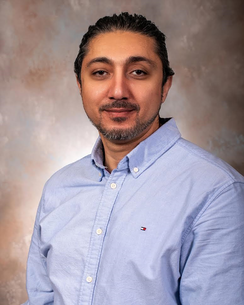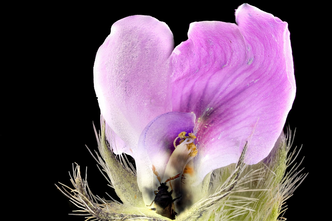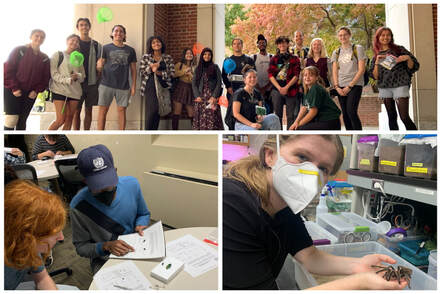|
The Department of Entomology is pleased to announce Katy Evans and Arielle Arsenault-Benoit as the recipients of the first Charles F. Reichelderfer Memorial Mentorship Award for their outstanding impact on the professional development of their mentees. Each awardee made positive impacts on the academic ambitions of several people, but the mentorship of each was especially notable for inspiring an undergraduate student to pursue graduate work in Entomology. In fact, both mentees have now been accepted into a graduate program. We also recognize the positive impacts of two additional nominees with an Honorable Mention. Anthony Nearman and Maria Cramer provided much-valued and appreciated guidance to undergraduate and junior graduate students. We thank Katy, Arielle, Anthony and Maria for setting an important example in building a supportive professional community in our department.
Congratulations to the Fritz lab for their award winning posters at the Mid-Atlantic Mosquito Control Association (MAMCA) annual conference. UMD-SOARE student Sommer Stephens placed first, for her award winning poster, "Allele frequencies of Culex pipiens bioforms vary across an urban to rural gradient." When not messquitoing around in the Fritz lab for the summer, Sommer is a student at NC State majoring in Animal Sciences. Sommer's proud UMD mentor, Arielle Arsenault-Benoit, also placed in the poster competition with her work, "Spatiotemporal organization of cryptic North American Culex species along an urbanization gradient in greater Washington, D.C."
Link to MAMCA announcement: https://mosquito-va.org/scc-poster-competition facbook: https://www.facebook.com/UMDEntomology/posts/pfbid0KFt3UVwVW2eg9gbTjME1NWC5R3KRkm5MDw4wuc2V4rtZmjMz1rUKh3RJekWPVW5Gl twitter: https://twitter.com/UMDEntomology/status/1617938384651157505?s=20 written by: Taís Ribeiro and Brendan Randall
It is crucial for graduate students to learn how to design and execute scientific research. Using this research as an informative tool that affects both the livelihoods of people and addresses public needs is essential to communicating science. The ongoing educational partnership between the public and scientists is known as extension and it is one of the pillars of the Department of Entomology. At the first Entomology Research in Progress Seminars, we heard about the work of two researchers that not only perform scientific research but are actively involved in the dissemination and application of their research to solve problems faced by growers and the public. The postdoc Dr. Nathalie Steinhauer and her work in extension in Beekeeping operations, and the PhD Candidate Maria Cramer, who works in agricultural environments. Both of these researchers are passionate about teaching and learning from stakeholders by showing their scientific results and seeing how applied science affects people’s lives.  Photo Credit: Mohamed Sallam Photo Credit: Mohamed Sallam written by: Megan Ma This week’s colloquium speaker, Dr. Mohamed Sallam, is a disease and arthropod vector ecologist who has worked in a variety of positions. His previous appointments include working as a research scientist for developing integrated pest management programs, senior analyst at USEPA (United States Environmental Protection Agency), and entomologist for the U.S. Navy. His background has led him to a position in Bethesda, MD as an Assistant Professor at Uniformed Services University (USU), where he is mentoring students and facilitating safer conditions in deployed military environments and U.S. military bases. Specifically, he is seeking ways of preventing disease transmission by developing models to reduce arthropod-disease vector-host contact. This can include efficiently treating uniforms – identifying regions of the body that are more likely to be targeted by mosquitoes minimizes the cost of treating full uniforms while maximizing the protection of high-risk areas of vector-host contact. To consider the full range of environmental and public health hazards, Dr. Sallam emphasizes the importance of understanding micro- and macrohabitats. This begins with research that can link models with the biology of your organism of interest.  written by Leo Kerner We know that pollinators play a vital role in the health of every agroecosystem, but how can the agroecosystem benefit pollinators? Kathleen Evans, a PhD student in the Department of Entomology at the University of Maryland, is attempting to figure this out. Working in the EspíndolaLab, Katy is focused on plant-pollinator interactions and loves to engage with the public informing them of the importance of insects. She came to speak at our colloquium about her most recent project on floral diversification and its effects on beneficial arthropods and ecosystem services among edamame. Previously, Katy has worked on pollinator health in agroecosystems and sustainable honeybee management practices, and now her work takes a closer look at understanding plant-insect interaction in agroecosystems.  photo credit: Athanas photo credit: Athanas In Fall 22 a new club for insect-lovers formed on UMD’s campus, Bug Club. While there has long been interest in forming an undergraduate community group around arthropods, the First Look Fair really cemented the case that there was an abundance of excitement around forming a club. Sophia Athanas, undergrad and president of the club, said that at the Fair she, “noticed that students were very interested in arthropods and entomology (especially when giant millipedes were brought out!). However, many students either couldn’t fit any classes into their schedule or didn’t have the time to participate in extra academic activities, such as the honor’s thesis or minor. Forming Bug Club would solve this problem by providing a low-stress, no-commitment opportunity for students with even the smallest interest to see what entomology is like!” |
Categories
All
Archives
June 2024
|
Department of Entomology
University of Maryland
4112 Plant Sciences Building
College Park, MD 20742-4454
USA
Telephone: 301.405.3911
Fax: 301.314.9290
University of Maryland
4112 Plant Sciences Building
College Park, MD 20742-4454
USA
Telephone: 301.405.3911
Fax: 301.314.9290

 RSS Feed
RSS Feed




